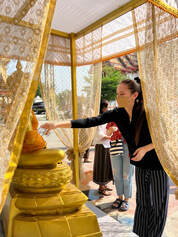|
The Thai New Year just ended, and I wanted to share everything I learned about my ancestry/heritage this week! This was the first year ever I got to spend Songkran in Thailand with my family. It was such a new, and fun experience that I am so grateful I got to be apart of. A Brief Overview of SongkranSongkran is the traditional Thai New Year festival. The celebration focuses on embracing goodwill, love, compassion. and thankfulness, using water as the means of expression. The word Songkran comes from Sanskrit meaning to move forward as well as referring to the passage of the sun from one sign of the Zodiac to another. This technically means that there are twelve Songkrans each year, but the significance of this specific Songkran is when the sun enters the sign of Aries the Ram. The event was also closely related to the Vernal Equinox. In the past, celebrating New Year at the time of the Vernal Equinox was very common. Songkran can be compared to celebrations similar to the Indian Holi Festival, the Chinese Ching Ming, and the Christian Festival of Easter. The dates of Songkran were originally set by astrological calculations, but the celebration is now fixed on 13 -15 of April. Songkran was the official New Year until 1888, when it was switched to a fixed date of April 1st. However, it wasn't until 1940, that New Years was shifted to January 1st. Currently in Thailand, New Year is now officially celebrated on January 1st like almost all other countries. Day by Day Activities
The Focused Values
Works Cited https://www.thaiembassy.sg/events/songkran-festival https://www.hostelworld.com/blog/songkran-everything-you-need-to-know/ https://www.officeholidays.com/holidays/thailand/songkran-festival
0 Comments
Leave a Reply. |
Details
AuthorPerpetua Smith has been studying business for over 7 years. Her main goal is to spread awareness on various topics to encourage and foster the education of others. She understands that information online has become oversaturated and hard to consolidate, therefore she is hoping to make information more easily understood and accessible. ArchivesCategories |
 RSS Feed
RSS Feed